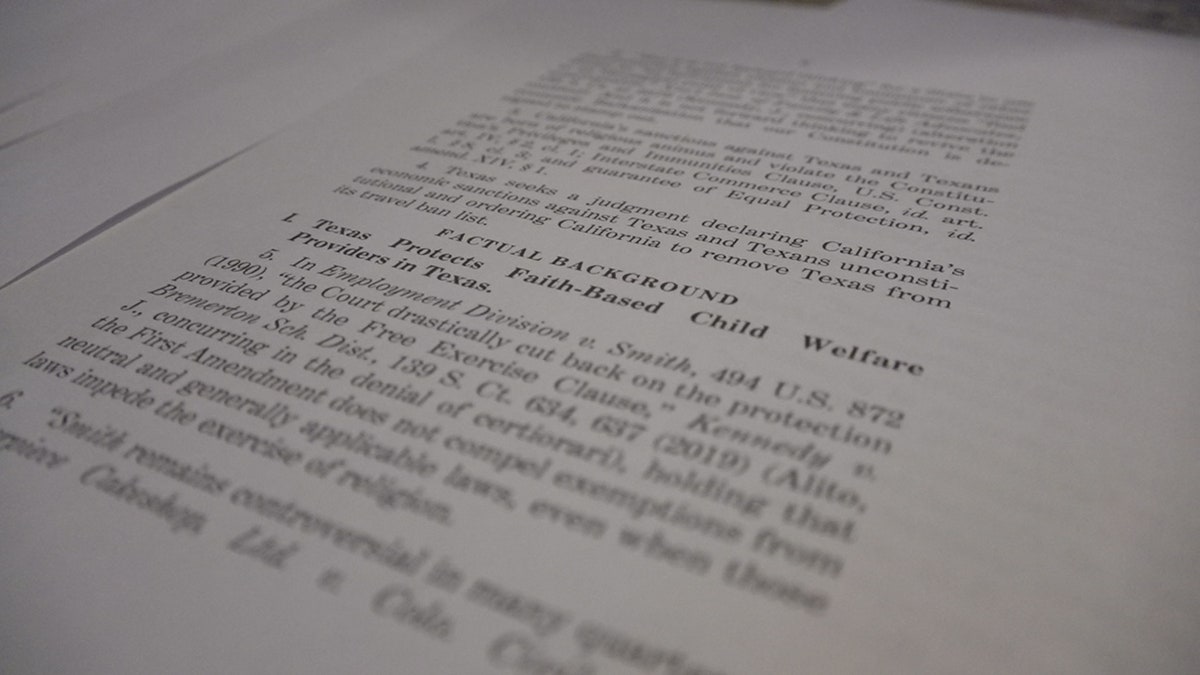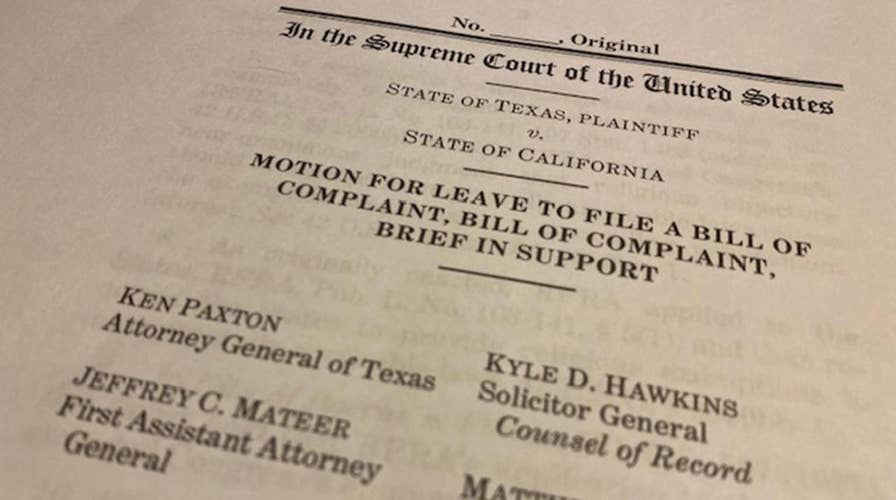Texas Attorney General files lawsuit warning ‘We are going to stop’ California travel ban
AG Ken Paxton says, The California ban punishes Texas for allowing faith-based foster care and adoption agencies to uphold their religious beliefs.
AUSTIN – Texas Attorney General Ken Paxton vowed to "stop" California's travel ban, which prevents state-funded travel to other states that are deemed discriminatory against the LGBTQ community.
After filing a lawsuit this week, Paxton told to Fox News the ban is "discriminatory" against the 11 states that are included in it.
“We shouldn’t be harmed because we have a different view,” Paxton, a Republican, said in an interview. “This was an important issue to us. We think it is important to the entire nation.”
TEXAS ASKS SUPREME COURT TO REPEAL CALIFORNIA'S MULTISTATE TRAVEL BAN
California's controversial Assembly Bill 1887 first went into effect in January 2017. Texas was subsequently added to the state's travel ban after leaders passed a law allowing adoption agencies to choose whether or not to allow a same-sex couple to adopt a child.
Paxton argued the ban amounts to one state imposing their views on another, which infringes on the state's right to make its own policies.
"In my view, we are the state that is not discriminatory. California is discriminating and narrowing the number of agencies and groups that can actually help," Paxton said.
The attorney general argued that California "limits the opportunities for these children." Paxton said that's why he feels a Supreme Court action is necessary after being on the travel ban list for more than three years.
"I just don't want them to impose their discriminatory views on us," Paxton said. "I think the way Texas views this is the more options we give these kids by allowing more organizations with different views to participate, it opens the door for us to be successful in placing these children."
“If their religious views say, we will not place and adopted child into a same-sex couple marriage or partnership, that is up to them and if other organizations decide they are going to, that is up to them,” Paxton said. “California discriminates and they say that religious organizations can’t do that and that’s fine for California, but now they are trying to impose those views on my state.”

Texas is one of 11 states impacted by the California travel ban.
The state of Texas joins 10 others on the travel ban list, including Alabama, Iowa, Kansas, Kentucky, Mississippi, North Carolina, Oklahoma, South Carolina, South Dakota and Tennessee.
Oklahoma became the first state to retaliate against California, enacting its own travel ban in January of 2020. Oklahoma GOP Gov. Kevin Stitt’s executive order bans all “non-essential travel” to the state of California. The ban does allow exceptions for the Oklahoma Department of Commerce, allowing the agency to continue recruiting efforts that “bring more job creators to the business-friendly state of Oklahoma.”

Texas was added to the list of prohibited travel states in 2017 after the state passed a law allowing child welfare providers to refuse to carry out services that violate their religious beliefs.
In a news release, Stitt said “California and it’s elected officials over the past few years have banned travel to the State of Oklahoma in an effort to politically threaten and intimidate Oklahomans for their personal values. Enough is enough. If California’s elected officials don’t want public employees traveling to Oklahoma, I am eager to return the gesture on behalf of Oklahoma’s laws that protect and ensure the right of an unborn child’s life.”
In 2018, Oklahoma was added to the travel ban after a policy was put in place allowing private foster and adoption agencies the right to deny placing children with families based in religious or moral grounds.
DOWNLOAD THE FOX NEWS APP HERE
The city of San Fransisco is the latest to deliver a blow to the Sooner State, banning city-paid travel to Oklahoma, citing laws that protect and ensure the right of an unborn child’s life. San Francisco’s ban, which applies to any state that bans abortion before a fetus reaches viability, also includes 21 other states, including Texas and eight others that are already on the state’s travel ban.
San Francisco’s ban went into effect on Jan 1.

Texas Attorney General Paxton said the ban deprives the state of tax revenue from hotels and other businesses that would have made money from travel by Californians.
Texas is now the first state to try to get the California state ban overturned. Paxton said the ban also deprives Texas of state revenue from the loss of spending at local businesses.
“We are are trying to protect the state form economic retribution, it’s underserved, we didn’t ask for it and are going to stop it,” Paxton said.
The suit is one that University of Houston Associate professor of law Emily Berman said is unlike anything the Supreme Court has seen before.
“Usually when states go to court against one another, it’s about a boundary dispute or fights over who is entitled to water from a particular river, but this is a new use of the courts,” Berman said. “The way that Texas views this law is that it is a targeted assault on the religious freedom of the citizens of Texas and usually those types of claims come up in the context of an individual, it’s not usually something that is brought up by state and certainly not by one state suing another state so we have sot of entered uncharted territory in lots of ways here.”

California Attorney General responds to lawsuit from Texas.
The office for California Attorney General Xavier Becerra said they are “reviewing the complaint.” Becerra, a Democrat, responded to a request for comment saying, “In California, we have chosen not to use taxpayer money to support laws discriminating against the LGBTQ community.”
Now that the initial brief has been filed, California will get an opportunity to file its own response brief.
“Once California has filed, they will distribute these response briefs to the justices and then they will consider whether or not to hear the case,” Berman said. “If the Supreme Court decides to hear this case then they will ask for briefings from he parties and then there will be oral arguments the way we traditionally see in Supreme Court cases and then we will wait and see what he court has to say."
Paxton said it's unclear when and if the Supreme Court will consider the lawsuit, though he did warn the legal battle could take years.

























